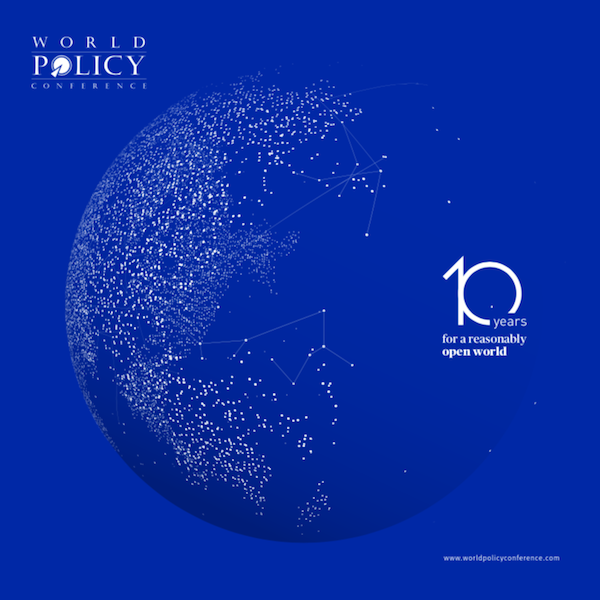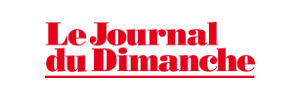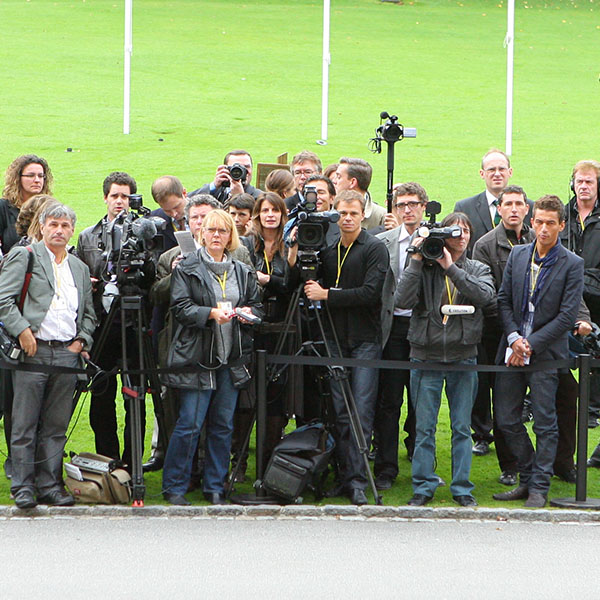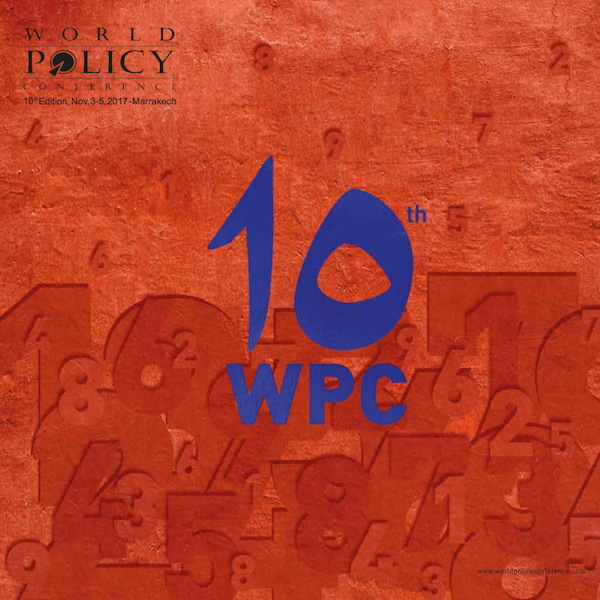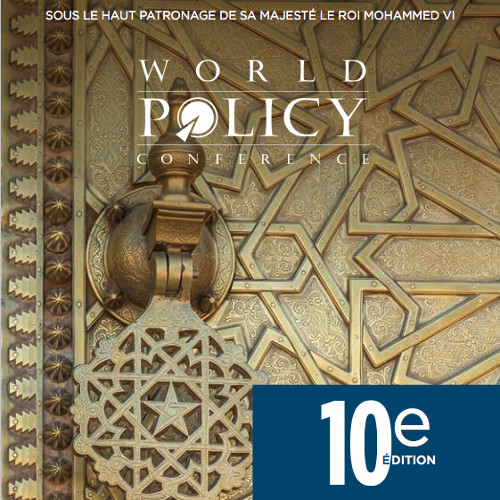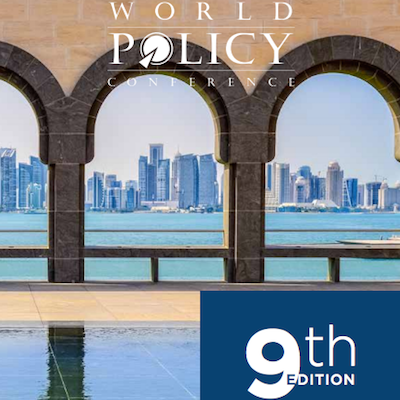Le Matin
CNES
United Way
L’Oréal
KNGK Group
PMI Impact
WPC Compendium “10 years”
TV5 Monde
Afrika News
Le Journal du Dimanche
Nikkei
Groupe Caisse des Dépôts
France Inter
Financial Times
Philips
Cegelec
Ministère Des Affaires Étrangères Et Européennes
Citelum
Orange
Video library
Photo gallery
Latest Tweets
2017 Report
2017 Conference proceedings
9:00 – 10:00 | Opening session
Thierry de Montbrial
Founder and Chairman of the World Policy Conference
Over the years the WPC has continuously stressed the importance of medium powers and the need for each State to include the structural stability of the international system and its components in formulating their own national interests.
HM The King Mohammed VI
King of Morocco
In-depth reflection and constructive debate will certainly lead to the emergence of new ideas and fresh solutions that will further improve our countries’ development models.
Emmanuel Macron
President of France
I could easily take on WPC’s goal as my own – thinking about ways to maintain reasonably open global governance, capable of absorbing shocks while also facilitating desirable changes
Bartholomew 1st
Archbishop of Constantinople-New Rome and Ecumenical Patriarch
We must therefore note the imperative need for dialogue in order to respond to contemporary conflicts, beyond the religious or non-religious nature of these conflicts. Dialogue is not a negotiation. Nor is it a controversy. There are no winners or losers in it.
10:00 – 10:45 | Plenary session 1
The future of South-East Europe
Thierry de Montbrial
Founder and Chairman of the World Policy Conference
Ana Brnabić
Prime Minister of the Republic of Serbia
There is basically one key disagreement, but we are trying to find a way to discuss it and talk about it in a way that will bring us closer to a resolution, and show that we do not want to leave this for the generations that will follow.
Edi Rama
Prime Minister of the Republic of Albania
People are no longer so frustrated and so reluctant to meet with each other, to come and go, to build business projects, to have cultural projects and so on, so it is a new way to live in the Balkans, which is fundamentally in discontinuity with our culture of living in the past.
Panelists Debate
10:45 – 12:00 | Plenary session 2
Investing in Africa
Jean-Michel Severino
President of Investisseurs & Partenaires
Miriem Bensalah-Chaqroun
President of the General Confederation of Moroccan Companies (CGEM)
As investors, we see education as human capital skills. We need skilled human resources, so we can match our competitiveness and productivity.
Christoph Beier
Vice Chair of the management board, Deutsche Gesellschaft für Internationale Zusammenarbeit (GIZ)
I think we are at the stage to rethink and re-evaluate our joint experiences, and then to come up with a more coherent, more comprehensive, more selective, and more promising development approach.
Mostafa Terrab
Chairman and CEO, OCP Group
Indeed, we are Arabs, we are part of MENA, but it overlooks the fact that we are fully African, and this has consequences.
Rémy Rioux
CEO of the Agence française de développement (AFD), Chairperson of the International Development Finance Club (IDFC)
In 1900, there were 100 million Africans. Now, there are 1.2 billion. As on all continents, that will spur endogenous employment and economic growth with a speed and power no other part of the world has ever seen.
Shinichi Kitaoka
President of the Japan International Cooperation Agency (JICA)
In the recent past, I think that resourceless countries are making, generally speaking, better progress, development than resourceful countries.
Debate
12:00 – 12:30 | Plenary session 3
With Peter Maurer, President of the International Committee of the Red Cross (ICRC)
Thierry de Montbrial
Founder and Chairman of the World Policy Conference
Peter Maurer
President of the International Committee of the Red Cross (ICRC)
Confidentiality and transparency are two different things. Transparency does not necessarily mean that everybody must know everything all the time. But accountability mechanisms must be set up.
Debate
12:45 – 14:30 | Lunch debate
With Sheikh Mohammed bin Abdulrahman bin Jassim Al-Thani, Minister of Foreign Affairs, State of Qatar
Thierry de Montbrial
Founder and Chairman of the World Policy Conference
Sheikh Mohammed Bin Abdulrahman Bin Jassim Al-Thani
Minister of Foreign Affairs, State of Qatar
We hope that one day, wisdom will prevail and that the countries who are trying to avoid engagement, avoid talking and addressing any of the security concerns, will understand they are our concerns too. They have to come to the table and solve the issues.
Debate
14:45 – 16:15 | Plenary session 4
Trends in the Middle East
Miguel Ángel Moratinos
Former Minister of Foreign Affairs and Cooperation of Spain
Youssef Amrani
Chargé de mission, Royal Cabinet, Morocco
The major challenge today in our region, in the entire Arab world is to deconstruct the jihadist narrative and also to propose an alternate narrative.
Jihad Azour
Director of the Middle East and Central Asia Department, IMF
It is important that we develop a forward-looking perspective on how things can develop in the years to come, so that we can define a certain number of actions that can have an impact and change the economic and social conditions of the people in the region.
Stuart Eizenstat
Partner, Covington and Burling LLP
The upsurge of nationalist, populist, protectionist, anti-immigrant, anti-Muslim sentiments and the weakening of the political centre are the thread that connects Brexit, the Trump election, the rise of right-wing anti-EU parties and attitudes in the Netherlands, Sweden, Germany, Austria, Poland and Hungary.
Renaud Girard
Senior reporter and international columnist at Le Figaro
Does the return of national feeling mean the proliferation of wars, the war of all against everyone in the Middle East?
Odeh Aburdene
President of OAI Advisors, member of the Council on Foreign Relations
The Arab region has to combine good education, science, and technology to achieve economic growth and jobs for their young population.
Itamar Rabinovich
President of the Israel Institute, former Ambassador to the United States, Israel
We are now in what we call the post-Arab turmoil phase. We had an Arab Spring. We then had the Arab turmoil and the foundations of several Arab states have been shaken.
16:15 – 17:30 | Plenary session 5
Trust and truth in the digital age
Steven Erlanger
Chief Diplomatic Correspondent, Europe, New York Times
Haïm Korsia
Chief Rabbi of France
The truth does not lie in the affirmation of one thing, but in an ethical tension between two positions, which requires finding a balance.
Susan Liautaud
Founder and Managing Director, Susan Liautaud & Associates Limited
Technology has disempowered state institutions. Starting with the law, we see that legal systems lag very far behind technology, which is constantly changing and at an increasingly fast pace, and the law simply cannot keep up.
Oliver Bussmann
Founder & Managing Partner at Bussmann Advisory, Zug/Switzerland, former UBS and SAP Global CIO
In the end, we are talking about significant financial benefits, such as simplification, speed and transparency, so the technology itself is a new technology of trust that the community will build and there is momentum across the region that I think is unstoppable.
Anne-Thida Norodom
Professor of public law at the University of Rouen, France; Member of the Strategic Advisory Board of Ifri
What is at stake is sovereignty in the digital age, the idea that States can protect their laws, protect their values, by justifying the application of their national law to digital activities, knowing that American companies basically have a monopoly on those activities.
Stefan Heumann
Member of the management board of Stiftung Neue Verantwortung (SNV)
Fake news and disinformation on the Internet have become major challenges. We need to study this problem more carefully to better understand it. Coming up with solutions won’t be easy as we need to avoid undermining freedom of speech.
Debate
17:30 – 18:45 | Plenary session 6
The world economy
Richard Cooper
Professor of Economics, Harvard University
Uri Dadush
Senior Fellow, OCP Policy Center, Non-Resident Scholar, Bruegel
Protectionism in the United States is bound to be profoundly destabilising, both at home and abroad, and it is going to give a very bad example to the developing countries that we hope would be the future of our long-term prosperity.
Kemal Dervis
Vice President and Director of Global Economy and Development, Brookings Institution, former Minister of Economic Affairs of Turkey
On the one hand, you have this booming technology innovation, and on the other hand, you have measured productivity, which in terms of GDP statistics, is actually slowing down, where growth is slower than it has been for decades.
Jung Sung-Chun
Vice President, Department of International Macroeconomics & Finance, Korea Institute for International Economic Policy (KIEP)
The real wage growth is weak in the European economies, and that is, I think, the main barrier to the active recovery of the European economies.
Itoh Motoshige
Emeritus Professor of University of Tokyo and Professor of Gakushuin University, former Advisor to the Prime Minister
There are many discussions about the increasing protectionism, and yes, that is a concern, but at the same time, we can still have some prospects about the increase of a free-trade regime.
Qiao Yide
Vice Chairman & Secretary General, Shanghai Development Research Foundation
The income inequality has been reduced among different countries, but in each country, no matter whether advanced or developing, how do we solve the wide gap of income inequality?
Debate
18:45 – 19:45 | Plenary session 7
The future of transportation: connectivity and governance
Jim Hoagland
Contributing Editor, The Washington Post
François Barrault
Chairman of Idate/DigiWorld Institute; former CEO of BT Global Services and a BT Group PLC board member
You are not smart because you know better than somebody else, you are smart because you share, and young people and the Internet have put us in the sharing economy.
Patrick de Castelbajac
Head of Airbus Strategy and International
How close are we to urban air mobility and to the dream of flying around? From a technological standpoint, we are not very far.
Jean-Yves Le Gall
Chair of the ESA Council and President of the Centre National d’Etudes Spatiales (CNES), France
There is a strong need to conduct trials, to allow industry to design innovations for autonomous vehicles and to give governments enough data to inform policy decisions and legislation.
Panelists Debate
20:30 | Dinner debate
With Patrick Pouyanné, Chairman of the Board and CEO, Total
Thierry de Montbrial
Founder and Chairman of the World Policy Conference
Patrick Pouyanné
Chairman of the Board and CEO, Total
The first huge effort we thus need to make collectively is an effort to save energy and achieve energy efficiency. We need to avoid consuming energy.
Debate
09:00 – 10:30 | Plenary session 8
America and the world one year after Trump’s election
Richard Burt
Managing Director, McLarty Associates, former US Ambassador to Germany
Juan Gallardo
Chairman, Organización Cultiba SAB de CV, Mexico
Where are we right now in the renegotiations of NAFTA? I think we are facing a great opportunity, and at the same time a great threat.
Yukio Okamoto
President, Okamoto Associates, Inc., former Special Advisor to two Prime Ministers of Japan
Mr. Trump or the United States’ most serious concern is North Korea, which is the same for Japan. It is our highest national security agenda.
Ryu Jin Roy
Chairman and CEO, Poongsan Group, Republic of Korea
The good days of an entire family immigrating to America for better lives and opportunities are almost over unless you are qualified with some skill sets and are able to speak English
Alexander Panov
Member of the Advisory Board of the Security Council of the Russian Federation, Professor and Head of the department of diplomacy of MGIMO
Political dialogue on all levels has almost frozen. If witch hunts continue in the United States I cannot see a possibility of improving bilateral relations.
Hubert Védrine
Former French Minister of Foreign Affairs
The entire planet reacted very well to Trump’s decision on climate change, saying, “Whatever he does, we will continue honouring the agreement.”
John Sawers
Former head of the Secret Intelligence Service, United Kingdom
China is now replacing America in many places as the supporter and upholder of public goods, like action against climate change and in support of global trade.
Debate
10:30 – 11:00 | Coffee break
11:00 – 12:00 | Plenary session 9
Artificial intelligence and the future of human labor
Ali Aslan
TV host and journalist, Deutsche Welle TV
Masood Ahmed
President, Center for global Development, former Director, Middle East and Central Asia Department, IMF
Artificial Intelligence is happening, and it is coming much faster than we anticipated.
Mari Kiviniemi
Deputy Secretary-General, OECD; Former Prime Minister of Finland
When it comes to the basics of elementary education, people need a mix of strong cognitive and soft skills, to complement their ICT skills.
Holger Mey
Vice President, Advanced Concepts, Airbus
Once we start with automation and autonomous systems we automatically run into liability problems.
Patrick Nicolet
Group Executive Board Member, Capgemini
The way we look at the world compared to the past is fundamentally different and the type of work organisation will be completely distributed, so the hierarchical, social model, none of our institutions are geared to address these elements.
Debate
12:00 – 13:15 | Plenary session 10
The future of trade and international investments
Nicolas Barré
Managing Director, Les Echos
Marcus Noland
Executive Vice President and Director of Studies, Peterson Institute for International Economics
The real threat is the interaction between the macro policy and the trade policy.
Bark Taeho
President, Lee&Ko Global Commerce Institute, former Minister for Trade, Republic of Korea
There seems to be a growing consensus about the need to help all citizens share the opportunities and benefits of trade liberalisation.
Francis Gurry
Director General of the World Intellectual Property Organization (WIPO)
The vacuum that is being left by the policies of the current Trump administration is creating an opportunity for many countries to move into the space, and in particular China.
Stefan Mair
Member of the Executive Board, Federation of German Industries (BDI)
There is no alternative to resort to global governance, even if it means weakening national sovereignty. We have to strengthen supranational governance in the European Union.
Yi Xiaozhun
Deputy Director-General, WTO
We must be aware that many people feel disconnected from economic progress and attitudes towards trade and globalisation have hardened recently.
Debate
13:30 – 15:00 | Lunch debate
With Ahmet Davutoglu, Former Prime Minister of the Republic of Turkey
Thierry De Montbrial
Founder and Chairman of the World Policy Conference
Ahmet Davutoglu
Former Prime Minister of the Republic of Turkey
We need integrity, inclusivity, institutionalisation, interest optimisation and implementation of decisions.
Debate
15:15 – 18:15 | Parallel workshops
Workshop #1 – Finance and economy
John Lipsky
Senior Fellow, Foreign Policy Institute at Johns Hopkins University’s Paul H. Nitze School of Advanced International Studies (SAIS); former First Deputy Managing Director, IMF
Despite the good news, US business investment has remained relatively weak, which explains the slow productivity growth that has been accompanied, despite the low unemployment, by low labour participation.
Akinari Horii
Special Advisor and a member of the Board of Directors of the Canon Institute for Global Studies, former Assistant Governor of the Bank of Japan
In economics terms, inflation expectation is more adaptive than rational, or more backward looking than forward looking. People have to see actual inflation through their eyes, before they believe that the inflation is reality.
Bertrand Badré
Founder and CEO, Blue Orange Capital; Former Managing Director, World Bank
For 10 years we were miserable talking about the Eurozone and for once, I think it is okay.
André Levy-Lang
Former Chairman & CEO of Banque Paribas, Affiliate emeritus professor in Finance at Paris-Dauphine University
I think that France is now realising that it has to take care of itself and not wait for Germany and I think that this is what is going to happen.
Jeffrey Frieden
Professor of government at Harvard University
I think that one of the unheralded and perhaps unexpected successes of the last 10 years was the extent of multilateral cooperation in the aftermath of the September/October 2008 crisis.
Raed Charafeddine
First Vice- Governor of the Central Bank of Lebanon
What the Central Bank did was actually stimulating the economy and at the same time, taking the precautions so as not to impact inflation.
Debate
Old sins cast long shadows and the shadow that Argentina’s restructuring casts on the region and beyond is still quite dark.
Daniel Daianu
Member of the Board of the Central Bank of Romania; former Finance Minister of Romania
In spite of the efforts to maintain what is called the liberal international order, deep currents are working against it.
Debate
Workshop #1 – Finance and economy – Synopsis
Bertrand Badré
Founder and CEO, Blue Orange Capital; Former Managing Director, World Bank
The system needs to think out of the box and is paralysed, because the system does not allow you to think out of the box. How can we move this?
André Levy-Lang
Former Chairman & CEO of Banque Paribas, Affiliate emeritus professor in Finance at Paris-Dauphine University
I think that there is no bank in Europe that creates a systemic risk. The European banking system is sound, but there is a problem in terms of profitability […] partly because of the vagaries of the capital markets.
Raed Charafeddine
First Vice- Governor of the Central Bank of Lebanon
What the Central Bank did was actually stimulating the economy and at the same time, taking the precautions so as not to impact inflation.
Daniel Daianu
Member of the Board of the Central Bank of Romania; former Finance Minister of Romania
Financial innovation goes on and toxic products are put on the market and used, in spite of an allegedly more effective regulation and supervision system.
Jeffrey Frieden
Professor of government at Harvard University
I worry that, when the next crisis comes, intervention by the major powers, and in particular by the US, will be more destructive than constructive.
Akinari Horii
Special Advisor and a member of the Board of Directors of the Canon Institute for Global Studies, former Assistant Governor of the Bank of Japan
The dearth of active mangers makes the market prone to herd behavior, which could induce runs in the market when a shock is applied to it.
John Lipsky
Senior Fellow, Foreign Policy Institute at Johns Hopkins University’s Paul H. Nitze School of Advanced International Studies (SAIS); former First Deputy Managing Director, IMF
The IMF’s lack of an effective crisis prevention instrument remains a systemic weakness that can and should be addressed.
Workshop #2 – Energy and climate
Nobuo Tanaka
Former Executive Director of the International Energy Agency, Chairman of the Sasakawa Peace Foundation
The energy sector is probably one of the most impacted by the unpredictability or uncertainty of the US policy.
Olivier Appert
Chairman of the Conseil Français de l’Energie
I will make a non‑politically correct statement by saying that Trump’s energy policy will have no direct impact on the CO2 emissions of the US.
André Caillé
Director of Junex Inc., former Chairman of the World Energy Council and Deputy Minister of the Environment of Quebec
It is not only the withdrawal from the Paris Accord but also the resurrection of coal fired power plants, supposedly clean, and the retirement of many regulations that could greatly impact US emissions.
Lee Hye-Min
G20 Sherpa, Ambassador for International Economic Affairs, Republic of Korea
The developing countries led by India and Turkey in particular stress the importance of parallel implementation of the Paris Agreement obligations, which are mitigation, adaptation and climate financing.
Tatsuo Masuda
Visiting Professor, Nagoya University of Commerce and Business Graduate School, Japan
We should not wait for governments to act, but rather communities, companies and civil societies can do everything.
Ladislas Paszkiewicz
Senior Vice President Strategy and Climate, Total
The difficulty for us as a corporation is how to supply this energy while at the same time decreasing our carbon footprint, which of course energy has an impact on.
Friedbert Pflüger
Director, European Centre for Energy and Resource Security, King’s College London
We will continue to need oil for a long time, especially in the developing nations, but gas can be a low-emission partner of renewables in the long run.
Discussion
Debate
Workshop #2 – Energy and climate – Synopsis
Nobuo Tanaka
Former Executive Director of the International Energy Agency, Chairman of the Sasakawa Peace Foundation
To produce a transport revolution, very strong government intervention is necessary.
Lee Hye-Min
G20 Sherpa, Ambassador for International Economic Affairs, Republic of Korea
The Paris Agreement is irreversible and the global community will move towards its implementation, though the road ahead will be very bumpy.
Friedbert Pflüger
Director, European Centre for Energy and Resource Security, King’s College London
Politicians tend to set goals for a distant future, in which they cannot be held accountable anymore.
Olivier Appert
Chairman of the Conseil Français de l’Energie
Trump’s energy policy will have no direct impact on the CO2 emissions of the US.
André Caillé
Director of Junex Inc., former Chairman of the World Energy Council and Deputy Minister of the Environment of Quebec
Natural gas should be used to replace coal.
Tatsuo Masuda
Visiting Professor, Nagoya University of Commerce and Business Graduate School, Japan
I think technology is a real game-changer in fighting climate change. Even people’s mindset will change accordingly.
Ladislas Paszkiewicz
Senior Vice President Strategy and Climate, Total
The difficulty for us as a corporation is how to supply this energy while at the same time decreasing our carbon footprint, which of course energy has an impact on.
Workshop #3 – China
Park, In-kook
President, Korea Foundation for Advanced Studies (KFAS)
In the wake of 19th Party Congress, what kind of economic reforms will we see? What impact will they have on the world economy?
Jia Qingguo
Dean of the School of International Studies of Peking University
The message is that you do not have to follow the Western approach in your development. Instead, you can find you own path of development according to your situation.
Qiao Yide
Vice Chairman & Secretary General, Shanghai Development Research Foundation
The conclusion is that China is moving towards the centre of the world stage. The detail is that we will continue to make a great contribution to the global GDP growth.
Douglas Paal
Vice President, Carnegie Endowment for International Peace
There are many more positives in addressing the challenge that China presents to the long-term American presence in the region.
Richard Cooper
Professor of Economics, Harvard University
These are poor countries west of China; they can use some help, and if China is willing to give the financing, we should applaud it so long as it turns out well.
Bark Taeho
President, Lee&Ko Global Commerce Institute, former Minister for Trade, Republic of Korea
After the conclusion of the Party Congress, there seems to be an agreement that China’s policy of reform and opening will be continued.
Yuichi Hosoya
Professor, Department of Political Science, Keio University
Without strong American commitment, I think that Japan has to change a previous strategy for the region, to create something like TPP without the United States.
Jean-François Copé
Mayor of Meaux, former delegate Minister of the Budget, France
I think that the European Union today is ready, provided it has its own capacity to continue and intensify the structural reforms, to be at a good level to be one of the major partners for China and Asia.
Debate
Workshop #3 – China – Synopsis
Douglas Paal
Vice President, Carnegie Endowment for International Peace
The United States ought to be coming forward with a policy of co‑optation of China’s new desire to be a more responsible stakeholder in the world.
Park, In-kook
President, Korea Foundation for Advanced Studies (KFAS)
The most critical factor is whether the Trump administration continues to maintain the North Korea challenge as its top priority.
Bark Taeho
President, Lee&Ko Global Commerce Institute, former Minister for Trade, Republic of Korea
If certain industries enter into the restructuring process, the implementation of the market opening policy may face difficulties and possibly be delayed.
Richard Cooper
Professor of Economics, Harvard University
These are poor countries west of China; they can use some help, and if China is willing to give the financing, we should applaud it so long as it turns out well.
Jia Qingguo
Dean of the School of International Studies of Peking University
The principal contradiction facing Chinese society is the contradiction between the unbalanced and inadequate development and the people’s ever-growing need for a better life.
Qiao Yide
Vice Chairman & Secretary General, Shanghai Development Research Foundation
The Chinese people is still and will remain for a long time, in the initial stages of socialism.
Yuichi Hosoya
Professor, Department of Political Science, Keio University
It is essential for the Japanese Prime Minister or government to try and invite the United States to come back to the regional order as a leader of this region.
Jean-François Copé
Mayor of Meaux, former delegate Minister of the Budget, France
Globalisation is changing shape and the “new Silk Road” symbolises this change.
Workshop #4 – Russia in twenty years
Igor Yurgens
Chairman of the Management Board of the Institute of Contemporary Development, Russia
The fourth industrial will probably make the distances in Russia, that were our curse in many ways, a nonissue.
Alexander Dynkin
President, Institute of World Economy and International Relations (IMEMO), Russia
If nothing were to happen and Russia were to continue with the growth of an average of 2% a year, what does it mean in the global hierarchy?
Michel Foucher
Chair of applied Geopolitics at College of World Studies; Former Director of the policy planning staff of the French Foreign Ministry
Russia is certainly one of the countries that took less benefit from globalisation.
Donald Johnston
Chair of the McCall MacBain Foundation; Former Secretary-General of the OECD
Russia, with its rich human resource base, has the capacity to become once again a major global force in twenty years.
Yaroslav Lissovolik
Chief Economist, Eurasian Development Bank
A key issue for Russia will be quality rather than quantity. In terms of quantity, Russia is currently one of the highest recipients of labour markets in the world.
Artem Malgin
Vice-rector for general affairs and corporate relations, Moscow State Institute of International Relations (MGIMO)
There will be strong growth with Central and Eastern Europe and the Balkans, because now, there are no more emotions when it comes to Russia’s policy towards the Balkans.
Alexander Panov
Member of the Advisory Board of the Security Council of the Russian Federation, Professor and Head of the department of diplomacy of MGIMO
For Russia and China, if both countries would like to be the leaders of the world, it will be a chance to create a new international order using new international laws.
Debate
Workshop #4 – Russia in twenty years – Synopsis
Igor Yurgens
Chairman of the Management Board of the Institute of Contemporary Development, Russia
The fourth industrial will probably make the distances in Russia, that were our curse in many ways, a nonissue.
Alexander Dynkin
President, Institute of World Economy and International Relations (IMEMO), Russia
The demise of empires almost always brings tectonic shifts in the world order, and it also leaves long‑lasting territorial conflicts.
Michel Foucher
Chair of applied Geopolitics at College of World Studies; Former Director of the policy planning staff of the French Foreign Ministry
If we are not able to set up a new European order in the next 20 years, a new European concert, we will remain weak in the international sphere and be unable to promote stability in the critical neighbourhood that EU and Russia are sharing.
Donald Johnston
Chair of the McCall MacBain Foundation; Former Secretary-General of the OECD
Russia, with its rich human resource base, has the capacity to become once again a major global force in twenty years.
Yaroslav Lissovolik
Chief Economist, Eurasian Development Bank
Russia is doing it together with the European Economic Union, but there are dozens of countries that are waiting in line to forge a free trade area with Russia and its Eurasian partners.
Artem Malgin
Vice-rector for general affairs and corporate relations, Moscow State Institute of International Relations (MGIMO)
In 20 years, Russia will be much more self‑centred and self‑concerned, with policy and ambitions made-to-measure.
Alexander Panov
Member of the Advisory Board of the Security Council of the Russian Federation, Professor and Head of the department of diplomacy of MGIMO
For Russia and China, if both countries would like to be the leaders of the world, it will be a chance to create a new international order using new international laws.
20:00 – 20:30 | Cocktail
20:30 | Gala Dinner
With Nasser Bourita, Minister of Foreign Affairs of the Kingdom of Morocco
Thierry de Montbrial
Founder and Chairman of the World Policy Conference
Nasser Bourita
Minister of Foreign Affairs of the Kingdom of Morocco
Morocco does not consider itself a “power” (sub-regional, regional or international) but a “hub” of diplomacy, action and ideas for building an imaginative new paradigm.
08:30 – 09:30 | Reports from parallel workshops
Workshop #1 – Report 1
John Lipsky
Senior Fellow, Foreign Policy Institute at Johns Hopkins University’s Paul H. Nitze School of Advanced International Studies (SAIS); former First Deputy Managing Director, IMF
Even though in the medium-term there are certainly fundamental issues that need to be faced, the principal risks in the near-term are those stemming from political or geopolitical developments.
Workshop #2 – Report 2
Nobuo Tanaka
Former Executive Director of the International Energy Agency, Chairman of the Sasakawa Peace Foundation
International coordination is necessary, but private sector efforts will yield a very significant improvement for the future of climate change mitigation.
Workshop #3 – Report 3
Park, In-kook
President, Korea Foundation for Advanced Studies (KFAS)
In the next five years, China will have more continuity than change in foreign policy, and there will be more of a Xi imprint, and Chinese foreign policy will be more pragmatic.
Workshop #4 – Report 4
Igor Yurgens
Chairman of the Management Board of the Institute of Contemporary Development, Russia
Negative scenario: in 20 years, we are in a real fight between autocracy and democracy, and positive scenario: we manage to build bridges, to create new ideas, and we make a huge step forward in terms of global governance, of togetherness.
09:30 – 11:00 | Plenary session 11
The European Union and the world
Ali Aslan
TV host and journalist, Deutsche Welle TV
Richard Burt
Managing Director, McLarty Associates, former US Ambassador to Germany
We are going through a really crucial and historical change in which the message from Washington to Europe and the EU is now: ‘You are on your own.’
Steven Erlanger
Chief Diplomatic Correspondent, Europe, New York Times
The Germans are desperate to have a France that is in better shape, partly to share the responsibility and the blame for European leadership, because there is a lot of anti-German feeling in Southern and Eastern Europe.
Elisabeth Guigou
President of The Anna Lindh Euro-Mediterranean Foundation for the Dialogue Between Cultures, Former Member of Parliament and President of the Commission of Foreign Affairs at the Assemblée nationale, France
But Brexit is also an opportunity for the 27, who, for the moment, have stood united in the negotiations in order to overcome their divisions, agree on their common interests and take their destiny in the global world into their hands.
Bogdan Klich
Senator, Minority Leader of the Senat, former minister of Defense, Poland
That is why, in this deteriorating environment, we have to do something with our European capabilities in the sphere of security and defence. It means that Europe should take more responsibility for its own security.
Michael Lothian
Former Member of Parliament, United Kingdom
One of the keys to the change we are seeing around us in the world is the growth in anti‑establishment feeling.
Yukio Okamoto
President, Okamoto Associates, Inc., former Special Advisor to two Prime Ministers of Japan
Who in the world can we partner with? There is only the EU. The EU is the best partner for Japan in this new campaign.
Debate
11:00 – 11:30 | Plenary session 12
With Tsakhiagiyn Elbegdorj, Former President of Mongolia
Tsakhiagiyn Elbegdorj
Former President of Mongolia
We are really proud of our history, we are really proud of our present state, and Mongolia is the only liberal political and economic establishment since 1990 in the region.
Debate
11:30 – 12:30 | Plenary session 13
The development of Africa
Sean Cleary
Founder and Executive Vice-Chairman of the FutureWorld Foundation and Chairman of Strategic Concepts (Pty) Ltd, South Africa
Nizar Baraka
Chairman, Economic, Social and Environmental Council (CESE)
How to integrate our entire continent? (…) I believe that this is the real bold move that will enable us to enjoy endogenous growth, growth that carries Africa, and that will truly make Africa the master of its fate, looking ahead to a time of involvement and integration with its partners.
Cheikh Tidiane Gadio
President of the Institute for Pan-African Strategies (IPS), Former Foreign Minister of Senegal
For Africans and their friends, it is time for a change in paradigm; it is time to reflect again on how to save this continent.
Aminata Touré
Former Prime Minister of Senegal
We also need to build solidarity, to tackle challenges such as corruption, terrorism, illegal migration, climate change impact, and solidarity in sharing progress.
Lionel Zinsou
Co-President of the Fondation AfricaFrance, Former Prime Minister of Benin, Former President, PAI Partners
We have no economic suspense, but we have a political and social suspense, because our model does not resolve any of our social problems on its own, unless we design policies that are extremely well-suited to this very particular constraint.
Debate
13:00 – 14:30 | Lunch debate
With Aziz Mekouar, Ambassador of Morocco, in charge of the negotiations on climate
Thierry de Montbrial
Founder and Chairman of the World Policy Conference
Aziz Mekouar
Ambassador of Morocco, in charge of the negotiations on climate
If you look at all the decisions taken by many countries, especially China, but also in Norway and other countries (…), we see a lot happening in terms of research, in terms of science, and in terms of transforming science into implementation.
Debate
15:00 – 16:30 | Plenary session 14
Security in Asia
Marcus Noland
Executive Vice President and Director of Studies, Peterson Institute for International Economics
Yim Sung-Joon
Senior Advisor at Lee International IP & Law Group; Former Deputy Minister for Foreign Affairs and National Security Advisor to the President, Republic of Korea
Continuation of stringent sanctions on North Korea plus extended US deterrence and show of strength would be the best option to deter North Korean provocation.
Yuichi Hosoya
Professor, Department of Political Science, Keio University
The Japanese strategy is, of course, to avoid war but, at the same time to try to denuclearise North Korea.
Jia Qingguo
Professor and Dean of the School of International Studies of Peking University
The good news is that President Xi and President Trump seem to have gotten along with each other so far, it is quite impressive that these two strong characters find each other worthy of respect.
Michael Yeoh
Founder & CEO of the Asian Strategy and Leadership Institute (ASLI)
We need to have more intelligence sharing among countries in Asia because that is so important in the fight against terrorism.
Jusuf Wanandi
Co-founder, Vice Chairman of the Board of Trustees and Senior Fellow of the Centre for Strategic and International Studies (CSIS) Foundation, Indonesia
On the one hand the rise of China, and especially with President Xi Jinping’s strong leadership, and on the other the election of President Trump, with his capriciousness, have created many uncertainties for us, because we cannot follow his thinking and where he would like to go.
Mayankote Kelath Narayanan
Former Governor of West Bengal, The Raj Bhavan, India
Afghanistan may be in South Asia, but I think it is the heart of Asia.
Debate
16:30 – 17:45 | Plenary session 15
Young Leaders session
Patrick Nicolet
Group Executive Board member, Capgemini
Natalie Cartwright
Co-founder of Finn.ai
I think AI is going to bring amazing changes. Our challenge is how we build governance structures, policies, and systems that are as nimble, innovative, and equitable as the companies they will support.
Edouard Nattée
Founder and CEO of Fox Intelligence
Transparency and accountability are the only way towards change. Starting by setting transparency as the default mode, while always protecting privacy and personal information, is the first step any leader should take.
Allen Ali Mohammadi
Co-founder, Hippogriff AB
We are living in a time where we have access to advanced technologies and high‑quality infrastructure that can empower us to tackle the challenges we are facing.
Arthur Stril
Co-founder, Zinc
We are on the cusp of a healthcare revolution and that there is truly a time, which is now, where healthcare is going to profoundly change, especially in the way it is delivered.
Aurélien Billot
Head of the Commercial and development policies Unit at the General Secretariat for European Affairs, France
In this thriving environment, we need an entity with democratic ownership that can address these issues of data governance, of access versus security, and of a level playing field, and I think that the EU has a chance here and could help fill this gap for all of us.
Debate
17:45 – 19:45 | Plenary session 16
The state of the world
Jim Hoagland
Contributing Editor, The Washington Post
Assia Bensalah Alaoui
Ambassador-at-large of HM the King of Morocco
It is clear that if you do not give people the chance to take up real issues in their societies, you do not provide the sustainable foundation for security. That is what we are trying to do in Morocco, thanks to the ambitious democratisation programme.
Kriengsak Chareonwongsak
Former Prime Ministerial Advisor of Thailand, Senior Fellow Harvard University and Chairman, Nation-Building Institute
There is a need for revolution coming that will change the entire architecture of the new global order so that economic, political, and social paradigms will be shifted and changed because today we experience a broken world that we cannot repair.
Ju Chul Ki
President of the Overseas Koreans Foundation, Former Senior Secretary for Foreign Affairs and National Security, Office of the President of the Republic of Korea
It is my view that the Iranian nuclear deal should be upheld. It would be very difficult to envisage another solution. I hope, personally, that the US Congress will take some decision on this matter.
Ashwani Kumar
Senior Advocate Supreme Court; Former Union Minister for Law & Justice, India
We are all individually and collectively duty bound – not once, not twice, but over and over again, to repeat what we believe is right because as Dante cautioned us – the hottest places in hell, said Dante, are reserved for those who in period of moral crises, which we face today, preserve their neutrality.
Mona Makram Ebeid
Egyptian Senator, Distinguished Lecturer, Political Science Department, American University in Cairo
The corollary to the growing influence of the security establishment has been the neutralizing of civilian politics. Civil society is under relentless pressure and its activities have been severely curtailed.
Fathallah Oualalou
Former Minister of Economy and Finance, Morocco
From the torment between this globalised present and the depths of culture and history, we must move on to managing coexistence between modernity, globalisation, and the depths of historical and cultural specificity.
Meir Sheetrit
Member of Parliament, Israel
I believe the only solution to reach peace with the Middle East is through what we call the Saudi Initiative, or the Arab Peace Initiative.
Yukari Niwa Yamashita
Board Member, Director, The Institute of Energy Economics, Japan (IEEJ)
I believe that we do not need more signatures on a piece of paper, but we need far more conviction and actions.
19:45 | Envoi
Thierry de Montbrial
Founder and Chairman of the World Policy Conference
2017 Program
2017 Agenda
2016 Conference proceedings
08:30 – 09:30 | Welcome coffee
09:30 – 10:30 | Opening session
Thierry de Montbrial
President and Founder of the World Policy Conference
A quarter of a century after the end of the cold war, the age is no longer conducive to dreaming of naïve globalisation and of the end of History. But we must learn to live better with globalisation as it really is, i.e. with a degree of interdependence that will deepen even more considerably.
Sheikh Abdullah bin Naser bin Khalifa Al-Thani
Prime Minister, Qatar
We are probably all aware that our contemporary world is going through an unprecedented phase, abundant with grave challenges to safety, stability and sustainable development in the shadow of the impaired world order that suffers from double standards in dealing with people’s affairs.
Jean-Marc Ayrault
Minister of Foreign Affairs and International Development, France
Faced with the world’s disorders, the only response is to join our forces, to show solidarity and to find collective solutions to shared problems. We need to continue our action. To act ceaselessly. To act while remaining loyal to our principles. Never to give up. That is France’s conviction.
Jim Hoagland
Contributing Editor, The Washington Post
Ahmet Davutoglu
Former Prime Minister of Turkey
The question is clear. Are we going towards global governance or towards world disorder? If you visit these capitals, you will see that there is a source of concern everywhere. What will be the future of international systems? What will be the future of the EU? What will be the policy of the new American president, Donald Trump? What will be the future of the Middle East?
10:45 – 12:30 | Plenary session 1
The future of the Middle East
Jim Hoagland
Contributing Editor, The Washington Post
Youssef Amrani
Royal Cabinet, Morocco
Fear took over and now, globalisation is seen as the root of all evil. So do we abandon the globalisation experiment? Or do we try and save it as it is and engage in a useless fight to save “business as usual”. Of course, the answer is neither.
Saeb Erekat
Palestinian Chief Negotiator, Palestine
Mark my words very carefully; what is going on in the Arab world is exactly what Europe went through on 15 March 1848, when Chancellor Metternich had to flee his palace after three weeks of peaceful demonstrations in Vienna.
Jim Hoagland
Contributing Editor, The Washington Post
Xiaosheng Gong
China’s Special Envoy on the Middle East Issue
First, passing initially through Iraq, Syria, Yemen, Libya, those four hot spots in crisis should be considered together. The international community should not emphasise the crisis in just one or two and forget others, especially Palestine issues.
Riad Hijab
Former Prime Minister, Syria
This escalation of the war waged by the regime and its Russian and Iranian allies falls under the shadow of pivotal transformations at all regional and international levels.
Miguel Ángel Moratinos
Former Minister of Foreign Affairs and Cooperation of Spain
We can and should try to solve this lasting conflict because instability in the Middle East will continue if the Palestinian Israeli issue is not resolved, even if we want to defeat Daesh or make peace with Syria internally.
Jim Hoagland
Contributing Editor, The Washington Post
Abdulaziz Othman bin Sager
Chairman of the Gulf Research Center, Saudi Arabia
Today, six years later, we could say that this Arab Spring was only able to achieve a few of its objectives.
Jim Hoagland
Contributing Editor, The Washington Post
Itamar Rabinovich
President of the Israel Institute, Distinguished Global Professor at New York University (NYU) and Distinguished Fellow at the Brookings Institution
What we are witnessing now is the collapse of a large number of states, at least six or seven states in the region meet the classic definition of failed state.
Panelists Debate
Debate
12:30 – 13:30 | Plenary session 2
Ethics and Government-Business relations
Susan Liautaud
Vice Chair of Court London School of Economics and Political Science, Founder and Managing Director Susan Liautaud & Associates Limited
Kriengsak Chareonwongsak
President of the Institute of Future Studies for Development; former Prime Ministerial Adviser, Thailand
The main idea is that all sectors, public, private and people, should collaborate fully to take charge of social well being.
Mari Kiviniemi
Deputy Secretary-General, OECD; Former Prime Minister of Finland
The ease with which individuals can avoid tax by shifting profits offshore has been simplified and as a result, multinational companies can move their most valuable assets to offshore low or no tax centres, where value creation does not happen.
Ashwani Kumar
Senior Advocate to the Supreme Court; Former Union Minister for Law & Justice, India
While the technological revolution has empowered people with unprecedented access to information and knowledge, questions arise about the ethical dimensions of a technology driven society.
Bruno Lafont
Co-chairman of the Board of Directors, LafargeHolcim
There is one interesting topic, which is rarely spoken about, which is whether we are all working for the general interest.
Panelists Debate
Debate
13:30 – 14:45 | Lunch debate
Thierry de Montbrial
President and Founder of the World Policy Conference
Guillaume Pepy
Chairman of SNCF’s Executive Board and Chairman and CEO of SNCF Mobilités
The only option we have is to address three game changes: the impact of climate change, of course; the urban population explosion; and the increasing scarcity of resources.
15:00 – 15:30 | Plenary session 3
Turkey’s European and international role
Thierry de Montbrial
President and Founder of the World Policy Conference
Ali Babacan
Member of Parliament and former Deputy Prime Minister, Turkey
In these kinds of organisations, the followers are asked to stop thinking, close their minds, lock their minds and do every kind of crazy things.
Debate
15:30 – 16:30 | Plenary session 4
Health: Technological development and global governance
John Andrews
Contributing Editor, The Economist
Sheikh Dr. Mohammed bin Hamad Al-Thani
Director of Public Health, Ministry of Public Health in Qatar
Modern technology has changed the structure and organization of the entire medical field.
Christian Bréchot
President of the Institut Pasteur, France
Scientists in the field of biomedical research do need infrastructures, equipment and technological platforms. This is at several levels.
Zhu Yan-Mei
Executive Vice President of the Beijing Genomics Institute
Last year, from the year 2000, the human genomics project has almost completely deciphered the genome.
Panelists Debate
You are making such advances in science and medicine. At some point, there must already be ethical boundaries.
16:30 – 18:00 | Plenary session 5
Technological change and the New Social Contract
Masood Ahmed
Director, Middle East and Central Asia Department, International Monetary Fund
Tobby Simon
Founder and Chairman, Synergia Foundation
Every couple of generations, we script new social contracts, and they keep evolving to better reflect our social norms and values.
Chang Dae-Whan
Chairman and Publisher of Maekyung Media Group, Republic of Korea
The fourth industrial revolution covers IoT, and I just learned IoL, which means life. There are robotic sensors, driverless cars or drones, and the genetic engineering, and fintech.
Patrick Nicolet
Group Executive Board Member, Capgemini
There is no question that technological change is drastically disrupting both workplaces and the social environment.
Sébastien Bazin
Chairman & CEO, AccorHotels
You are going to have more job destruction over the next 3 4 years than job creation. You have a gap of time for people to adapt to this new evolution.
Debate
18:00 – 18:30 | Coffee break
18:30 – 19:00 | Plenary session 6
UK after Brexit
Thierry de Montbrial
President and Founder of the World Policy Conference
John Kerr
Member of the House of Lords, former British Ambassador to the United States and the EU
The die will not be cast irrevocably when, by March, the government triggers the withdrawal proceedings.
Debate
Are we making too big a deal of Brexit? […] Basically, the UK has become a lot more competitive than it was before.
19:00 – 19:45 | Plenary session 7
Security and Economic Development in Africa
Thierry de Montbrial
President and Founder of the WPC
Cheikh Tidiane Gadio
President of IPS, Former Foreign Minister of Senegal
Africa is gradually becoming the epicentre of global terrorism.
Nathalie Delapalme
Executive Director, Research and Policy, Mo Ibrahim Foundation
Africa is 54 countries with 54 geographies, 54 different histories, 54 often-divergent trajectories.
Panelists Debate
Africa is becoming a battleground for the world’s great powers. The tragedy is that Africans are often sitting on the sidelines.
20:30 | Dinner debate
Thierry de Montbrial
President and Founder of the WPC
Chey Tae-won
Chairman, SK Group, Republic of Korea
Instead of genuinely contributing to society, many CSR activities tend to focus on building the company’s image and promoting the brand.
Kevin Rudd
President of the Asia Society Policy Institute in New York, Australia’s 26th Prime Minister and Former Foreign Minister
It can be argued that historical forces of inertia, entropy and chaos constitute the “steady state” of international relations.
08:30 – 09:45 | Plenary session 8
European Union: what next?
Steven Erlanger
London bureau chief of The New York Times
Elisabeth Guigou
Member of the French Parliament and President of the Commission of Foreign Affairs at the Assemblée nationale
The shock of the Brexit provides all the more evidence of the preexisting necessity to reshape the European project.
Norbert Röttgen
Chairman of the Foreign Affairs’ Committee, Bundestag, former German Federal Minister for the Environment, Nature Conservation and Nuclear Safety
We are at a point and situation not seen since World War II. There have not been so many crises at the same time, abroad and internally, in Europe and confronting Europe.
Panelists Debate
Germany still has a long way to go in this objective of a greater contribution to a foreign and defence policy. The only option I can see is for France and Germany to work on more coherent policies.
Debate
10:00 – 12:30 | Parallel workshops
Workshop #1 – Workshop 1: Finance and Economy
Jean-Claude Trichet
President of Bruegel; Former President of the European Central Bank
John Lipsky
Senior Fellow, Foreign Policy Institute at Johns Hopkins University’s Paul H. Nitze School of Advanced International Studies (SAIS)
Taking stock of where things stand today in regards of those goals, I would conclude that none of the [G20] goals have been attained.
Raed Charafeddine
First Vice- Governor of the Central Bank of Lebanon
After the 2008 crisis, Central Banks have shifted from being pure regulators overseeing the financial sectors into important players in the real economies.
Daniel Daianu
Member of the Board, Central Bank of Romania, former Finance Minister of Romania
The impact of the financial crisis is also significant: estimates are that the Great Recession has brought GDP potential growth below 1,5% in the EU for the next 5-10 years.
Hur Kyung-Wook
Senior Advisor to Bae, Kim & Lee LLC; Former Vice Minister of Strategy and Finance, Republic of Korea, former Ambassador of Korea to the OECD
Most Asian countries have turned to domestic consumption as well as investment, fuelled by Asian money both domestic and from abroad as well.
Kiyoto Ido
Vice Chairman, Institute for International Economic Studies, Japan
Abenomics is based on the three arrows of monetary easing, flexible fiscal policy and growth strategy.
André Levy-Lang
Affiliate emeritus Professor at Paris-Dauphine University, former CEO of Banque Paribas
Banks and insurance companies are no longer active players in capital markets and they used to be one of the stabilising forces in capital markets.
Debate
Workshop #2 – Workshop 2: Energy and Climate
Donald Johnston
Chair of the McCall MacBain Foundation, Geneva, Switzerland, Former Secretary-General of the Organisation for Economic Co-operation and Development (OECD) in Paris
Olivier Appert
Chairman of the Conseil Français de l’Energie
Every two years, a new Norway has been put into production in the US, and the US has become the most significant oil producer, surpassing Saudi Arabia and Russia.
Ladislas Paszkiewicz
Vice President Strategy & Climate, Total
Oil and gas is responsible for about 37% of the GHG emissions […]
Debate 1
Tatsuo Masuda
Professor, Nagoya University of Commerce and Business Graduate School, Japan
Maybe technology is the solution to all the problems that we face regarding energy and climate change.
Daniela Lulache
Chief Executive Officer, Nuclearelectrica, former Counselor of the Vice-Governor of the National Bank of Romania
We cannot reach this target of decarbonisation and we cannot solve all the climate change problems that are occurring without nuclear.
Lee Hye-Min
G20 Sherpa and Ambassador for International Economic Affairs, Republic of Korea, Former Ambassador to France, former Deputy Minister for Trade, Republic of Korea
We need to implement a commitment regarding mitigation and adaptation, but developed countries should provide financial means.
Debate 2
Workshop #3 – Workshop 3: China in transition
Park In-Kook
President, Korea Foundation for Advanced Studies (KFAS), former Ambassador and Permanent Representative of the Republic of Korea to the United Nations
Jia Qingguo
Professor and Dean of the School of International Studies of Peking University
The country biggest challenge is how to sort out the rules so that people can do things legitimately and quickly.
Qiao Yide
Vice Chairman & Secretary General, Shanghai Development Research Foundation
The Chinese government defines six industries as ‘emerging industries with strategic importance’: cyber economy; high-end manufacturing; digital economy; green and low carbon; bio economy.
Richard Cooper
Professor of Economics, Harvard University
What can we expect of a Trump administration? And how will it affect China?
Douglas Paal
Vice President, Carnegie Endowment for International Peace
It will be a good time for China. That is widely felt in the business community and outside official ranks.
Bark Taeho
Professor, GSIS, Seoul National University
The Doha Round of multilateral trade negotiations is stalled going nowhere.
Michel Foucher
Chair of applied Geopolitics at College of World Studies (FMSH-ENS), former Director of the policy planning staff of the French Foreign Ministry
It’s important to understand that the general context has changed. […] So classical Realpolitik is the new norm, with areas of influence, pacts and alliances, logistical and military facilities abroad.
Yuichi Hosoya
Professor, Department of Political Science, Keio University
President Trump will focus on an ‘America First’ policy, which means that the United States will reduce in some way its engagement in East Asia.
Debate
12:45 – 14:15 | Lunch debate
Thierry de Montbrial
President and Founder of the World Policy Conference
Shivshankar Menon
Chairman of the Advisory Board of the Institute of Chinese Studies in New Delhi, and Distinguished Fellow at the Brookings Institution, Washington, Former National Security Adviser to the Prime Minister, India
India is undergoing massive internal change, so rapid that we really still have to come to terms with it.
14:15 – 16:00 | Plenary session 9
Post-American Elections
Jim Hoagland
Contributing Editor, The Washington Post
François Bujon de l’Estang
President, FBE International Consultants, former Chairman of Citigroup France
Many questions also have been posed about a deeply divided America, which was really the background to this election.
Ichiro Fujisaki
Chairman of the Institute of International Relations, Sophia University, Japan, Former Ambassador of Japan to the United States
What will happen? On three fronts, policy may have to be watched in the following areas: environment, trade and the Middle East.
Jin Roy Ryu
Chairman and CEO, Poongsan Group
President elect Trump’s campaign slogan “Make America great again” captured the hearts of those who voted for him.
Juan Gallardo
Chairman, Organizacion Cultiba SAB de CV, Mexico
There are also more Mexicans coming back to Mexico than going to the US now for at least two to three years running. The idea of having a well-controlled and properly monitored border has been alive and working strongly.
Vuk Jeremic
President, Center for International Relations and Sustainable Development (Cirsd), former Minister of Foreign Affairs, Serbia
One can see how Donald Trump’s election victory may serve as a boost to populist movements, ideas, and candidates in the forthcoming Western European elections.
Wang Jisi
President of the Institute of International and Strategic Studies, Peking University, and professor of the School of International Studies, Peking University
China has been one of the largest beneficiaries of economic globalization, and the next step of reform and opening will continue to depend on open markets and free interflow of capital.
Ryan Evans
Founder, CEO, Editor – War on the Rocks
We actually have to be prepared for the breakdown of democracy in the United States and perhaps even the introduction of some form of autocracy.
Debate
16:00 – 16:30 | Plenary session 10
Space as a major technological and governance adventure
Thierry de Montbrial
President and Founder of the World Policy Conference
Jean-Yves Le Gall
President of the Centre National d’Etudes Spatiales (CNES), President of the International Astronautical Federation (IAF), co-Chair of the Council of the European Space Agency
Satellites are crucial instruments supporting efforts to curb climate change.
Debate
16:30 – 17:00 | Coffee break
17:00 – 18:30 | Plenary session 11
Fighting Terrorism
Justin Vaïsse
Directeur du Centre d’analyse, de prévision et de stratégie du ministère des Affaires étrangères, France
Sergei Karaganov
Honorary Chairman of the Presidium of the non-governmental Council on Foreign and Defense Policy of Russia, Founder and former Deputy Director of the Institute of Europe of the Academy of Sciences of USSR/Russia
[Terrorist organisations] are also the result of unjustified, totally incompetent and irresponsible intrusion by foreign powers.
Mayankote Kelath Narayanan
Former Governor of West Bengal, The Raj Bhavan, Former Senior Advisor and National Security Advisor to the Prime Minister of India
The Internet will become a crucial weapon in the hands of the ISIS, once it morphs into ISIS 2.0. Already the ISIS has plans to use the ‘deep web’ and the ‘dark net’.
Jamal Khashoggi
General Manager, Editor in Chief Of AlArab News Channel
We have to go for the root cause of the problem. The root cause of the problem is chaos and anarchy.
Wang Jisi
President of the Institute of International and Strategic Studies, Peking University, and professor of the School of International Studies, Peking University
Anti-terrorism has assumed a higher place on China’s domestic agenda – it occupies a higher place on the list of priorities.
Jehangir Khan
Director of the UN Counter-Terrorism Implementation Task Force (CTITF) and the UN Counter-Terrorism Centre (UNCCT) in the Department of Political Affairs (DPA) in the UN Secretariat
The reason we are concerned about terrorism is that it has a human face. What is that human face? It is the face of the victim.
Panelists Debate
Debate
18:30 – 19:30 | Plenary session 12
Political and Economic Stability in East Asia
Richard Cooper
Professor of International Economics, Harvard University
Ichiro Fujisaki
Chairman of the Institute of International Relations, Sophia University, Japan, Former Ambassador of Japan to the United States
Japan is seen as one of the countries bringing stability to the region. This is because our relations with countries around us have changed very drastically.
Jia Qingguo
Professor and Dean of the School of International Studies of Peking University
One of the hotspots is North Korea’s nuclear development. This challenge is approaching a threshold.
Ju Chul-Ki
President of the Overseas Koreans Foundation, former Senior Secretary for Foreign Affairs and National Security to the President, Korea
There are always sources of instability in East Asia for it to continue to leap forward.
Debate
20:00 – 20:30 | Cocktail
20:30 | Official Dinner
Thierry de Montbrial
President and Founder of the World Policy Conference
Soltan bin Saad Al-Muraikhi
Minister of State for Foreign Affairs, Qatar
The State of Qatar has played a key role in mediation to reach peaceful settlements to conflicts in several areas of the world.
08:45 – 10:00 | Plenary session 13
Virginie Robert
Foreign desk Editor, Les Echos
Panelists Debate
Maurice Obstfeld said that turning back the clock on trade can only deepen and prolong the world economy’s current doldrums, yet we see less and less support for trade agreements in the US, as in Europe.
Debate
The US cannot be isolated from the global economy, so what alternative could there be?
10:00 – 11:15 | Plenary session 14
Steven Erlanger
London bureau Chief of The New York Times
Panelists Debate
Hydrocarbons are very important in this region and will remain an important for decades for many reasons.
11:15 – 11:45 | Coffee break
11:45 – 12:30 | Reports from parallel workshops
Workshop #1 – Report 1
Jean-Claude Trichet
President of Bruegel; Former President of the European Central Bank
The poor level of investment was quoted frequently as one of the reasons why growth was so mediocre; the abnormal level of investment is not preparing the way for growth and labour productivity programmes, because the stock of capital is not what it should be.
Workshop #2 – Report 2
Marie-Claire Aoun
Director of the Center for Energy at the French Institute for International Relations (Ifri)
While peak oil supply threats were dominating the debates 10 years ago, today we are more talking about the peak oil demand which will probably be the outcome of energy transition policies.
Workshop #3 – Report 3
In-kook Park
President, Korea Foundation for Advanced Studies (KFAS), former Ambassador and Permanent Representative of the Republic of Korea to the United Nations
Chinese economy’s structural transition from export oriented economy to domestic consumption-led economy has already begun to manifest.
12:30 – 13:00 | Plenary session 15
Education and the role of women
Mona Makram Ebeid
Egyptian Senator and former member of Parliament, Distinguished Lecturer, Political Science Department, American University in Cairo
Two main issues concerning education and the role of women: one of them is flagship educational programs in the Arab world; the second is women as an untapped resource in the fight against terrorism.
Hamda Hassan Al-Sulaiti
Secretary General, Qatar National Commission for Education, Culture and Science
Qatar has [long] been interested in teaching young girls. This started in 1956, when it embarked on providing education to women.
Debate
13:00 – 14:30 | Lunch
14:30 – 15:45 | Plenary session 16
Diversification, Education and Employment in the Middle East
Mohamed Kabbaj
President of Lafarge Morocco, Chancelor of Euro-Mediterranean university of Fès and member of the Hassan II Academy of Science and Technology, former Advisor to His Majesty the King Mohammed VI, former Minister of Finance and Foreign Investment, Morocco
Uri Dadush
Senior Fellow, OCP Policy Center, non-resident scholar, Bruegel
Over the next several years the demographics will be favourable for solving the unemployment problem, not in the sense that it will be good, but that is will not be as bad as it has been in the past.
Masood Ahmed
Director of the IMF’s Middle East and Central Asia Department
Going forward, GCC governments are not going to have the resources to be able to employ all the nationals in the public sector, so they have to be employed increasingly in the private sector.
Mona Makram Ebeid
Egyptian Senator and former member of Parliament, Distinguished Lecturer, Political Science Department, American University in Cairo
It is simple: Egypt cannot reach its full potential without women. Great nations draw their strength from all their people. Harnessing that strength means tolerating differences that are peacefully expressed.
Hassan Al-Derham
President of Qatar University
With the discovery of oil and the exploitation of oil, people took the easy road, and that means the more comfortable road. This involves heavy reliance on government subsidies, government allowances, and government jobs as well.
Debate
15:45 – 17:00 | Plenary session 17
Young Leaders Session: Disruption, Populism and the World of Tomorrow
Manuel Muñiz
Director, Program on Transatlantic Relations, Weatherhead Center for International Affairs, Harvard University
Li Yi-Fan
CEO, Hesai Photonics Technologies
In this fast-evolving world, we are trying to see things in a different dimension, where you can jump out of this 2D dimension and to look at it in a different angle. And you come to a complete different conclusion and it is always disruptive.
Lionel Baraban
Co-Founder & CEO, FAMOCO
Populism is basically a lack of trust, and in the real world, like the digital world, you need to bring trust.
Caroline Goulard
CEO & Co-Founder, Dataveyes
Our ability to implement smart technologies exceeds by far our ability to understand how the algorithms that feed them work.
Pierre Dubuc
Co-Founder, OpenClassrooms
There needs to be a much stronger link between learning and employment. Today, recent graduates are struggling to find work that matches their skills.
Essa Al-Mannai
Executive Director at Reach Out To Asia, Qatar Foundation, Qatar
The youth are asking to be not just on the other side of the table as the recipient of the humanitarian work but to have an active, engaged, responsible player within the process itself.
Debate
17:00 – 17:30 | Coffee break
17:30– 19:30 | Plenary session 18
Final Debate
Bertrand Collomb
Honorary Chairman, LafargeHolcim
Hubert Védrine
Former French Minister of Foreign Affairs
Current events challenge not so much the present global order […] but the hopes and illusions of Westerners and of all the globalised elites.
Renaud Girard
Senior reporter at Le Figaro
Given their education and philosophical background, it is reasonable to think that Western leaders would take only rational, carefully considered decisions. They do not.
Michel Foucher
Chair of applied Geopolitics at College of World Studies (FMSH-ENS), former Director of the policy planning staff of the French Foreign Ministry
During a period of threats, it is appropriate to strengthen the exercise of basic sovereign functions and let it be known to opinion makers.
Manuel Hassassian
Ambassador of Palestine to the United Kingdom
Peace, stability and security in the Middle East have been lacking for decades now. The simple answer to this is the lack of a resolution to the Palestinian Israeli conflict.
Marcelo Sanchez Sorondo
Chancellor, Pontifical Academy of Sciences and Pontifical Academy of Social Sciences
The real solutions lie in making a heartfelt effort to defend human dignity and the liberty not only of every individual, but also of different populations.
Donald Johnston
Chair of the McCall MacBain Foundation, Geneva, Switzerland, Former Secretary-General of the Organisation for Economic Co-operation and Development (OECD) in Paris
You cannot imagine what a miracle the post war evolution of Europe has been. That is too often forgotten.
Yim Sung-Joon
Senior Advisor, Lee International IP & Law Group; Former President, Korea Foundation
As election day approached, these media even rated the chance of Clinton winning by over 90%.
Tadakatsu Sano
Attorney-at-law at Jones Day; Former Director-General of the Trade Policy Bureau and Vice Minister for International Affairs; Chief Executive Assistant to Prime Minister Yukio Hatoyama
The real loser seems to me to be the traditional establishment. Trump attacked career politicians, Media, Academia, business people in the finance industry and international institutions.
François Barrault
Chairman and Founder of FDB Partners SPRL
We have two worlds. There is the 1.0 world which is an extrapolation of the past […] Then there is the 2.0 world, which is the digital world.
Panelists Debate
Debate
19:30 | Envoi
Thierry de Montbrial
President and Founder of the World Policy Conference
Hassan bin Ibrahim Al Mohannadi
Director of Diplomatic Institute, MOFA, Qatar








